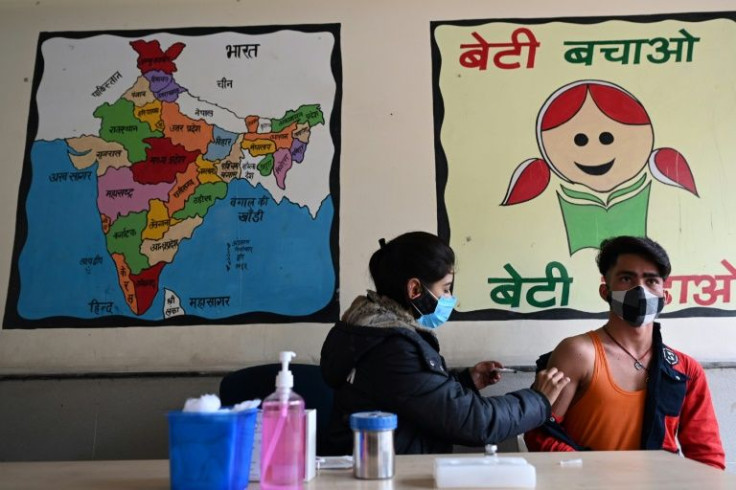India Braces For Omicron-Fueled Third Wave As Virus Lays Low Healthcare Workers
KEY POINTS
- Only 44 percent of the population are fully vaccinated
- Experts warn the wave could peak in the next two weeks
- Restrictions are already in place in major cities
India is bracing for the third wave of COVID-19 infections fueled by the Omicron variant as it sees a sudden and steep rise in COVID-19 cases across the country. This time, however, the country is hoping that its widespread vaccination drive could at least bring down the number of deaths, which made headlines across the world during the catastrophic second wave.
India recorded an explosion of coronavirus infections Tuesday, a daily tally of 57,974, or a single-day rise of 56%. The upswing was clearly visible in the country's two largest cities of the country, national capital Delhi and financial capital Mumbai, where curfews and restrictions are already in place.
But while the healthcare infrastructure is better this time with improved availability of oxygen for patients facing breathing difficulties, the increasing caseload has come as a blow to the healthcare system, which is buckling under the pressure. During the last wave, India witnessed heartbreaking scenes as COVID-19 patients and their relatives struggled to find hospital beds and ventilators, and dead bodies lined up outside crematoriums.
The enormity of the current situation is evident, with doctors and healthcare workers falling prey to the virus en masse, hobbling the healthcare system. Some 120 doctors have tested positive for COVID-19 and are under quarantine at four major hospitals in Delhi, while over 100 resident doctors have caught the infection in Mumbai, reports said.
The situation is more or less the same in the southern cities of Bengaluru and Chennai, which were hit badly by the second wave last May.
But it is more than the healthcare sector that is impacted. "The number of COVID-infected doctors is recorded, hence the public is aware of it," Dr. Rajeev Jayadevan, a former president of the Indian Medical Association's Kochi chapter, told International Business Times, adding the number of doctors and nurses getting infected is indicative of the surge in cases. "But the true figures among other sectors, like public transportation, education, entertainment go unnoticed."
While the media and the government are still talking of a "coming" third wave, Dr. Jayadevan is clear that the third wave has already set in. "Omicron cases are increasing in number. COVID-19 is a cyclical disease like many other viruses — which means they come and go. They will continue to infect large areas in cyclical patterns, each time with some genetic variation that apparently helps the virus leap past human immune response," he said.
He said vaccination alone won't eliminate the virus, but can lower the death rate. A multi-pronged approach is needed, including better room ventilation, mask mandates and restrictions on public gatherings to limit spread during times of surge, he said.
Though India, the world's largest vaccine maker, has embarked on a massive vaccination drive, the latest covering children between the ages of 15 and 18, experts say the situation is going to worsen in the next two weeks. There is no way the vaccination drive can catch up with the wildfire-like spread of the Omicron-driven third wave.
The vaccination stats also don't offer much comfort — only 44% of the adult population in the country of 1.39 billion people have been fully vaccinated.
Soumya Swaminathan, the chief scientist at the WHO, told Economic Times that "India could have a big surge. The next two weeks will tell us."
Swaminathan also took to Twitter to warn that "health systems can get overwhelmed." "Important to have systems to test, advise and monitor a large number of patients as the surge can be sudden and huge," she said.
#Omicron is NOT the common cold! Health systems can get overwhelmed. Important to have systems to test, advise and monitor large number of patients as the surge can be sudden and huge https://t.co/YSCcYFBCB7
— Soumya Swaminathan (@doctorsoumya) January 4, 2022
The health ministry has warned that it expects 10,000 COVID-19 infections in Delhi on Wednesday. With a weekend curfew in place, the state now may be heading toward a lockdown, reported India Today.
Similar night curfews are already in place in Bengaluru and Mumbai, and many other cities are mulling bringing back more restrictions to curb the wave.

© Copyright IBTimes 2024. All rights reserved.





















